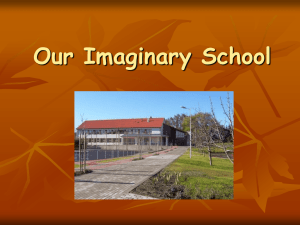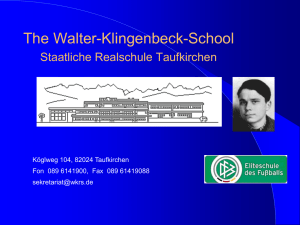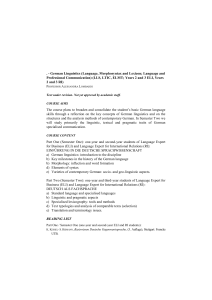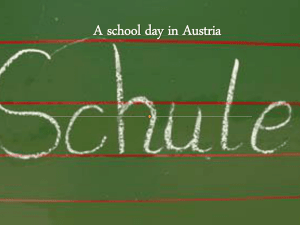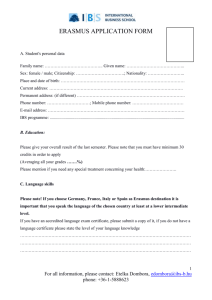Hugh Nurse 2013-14
advertisement
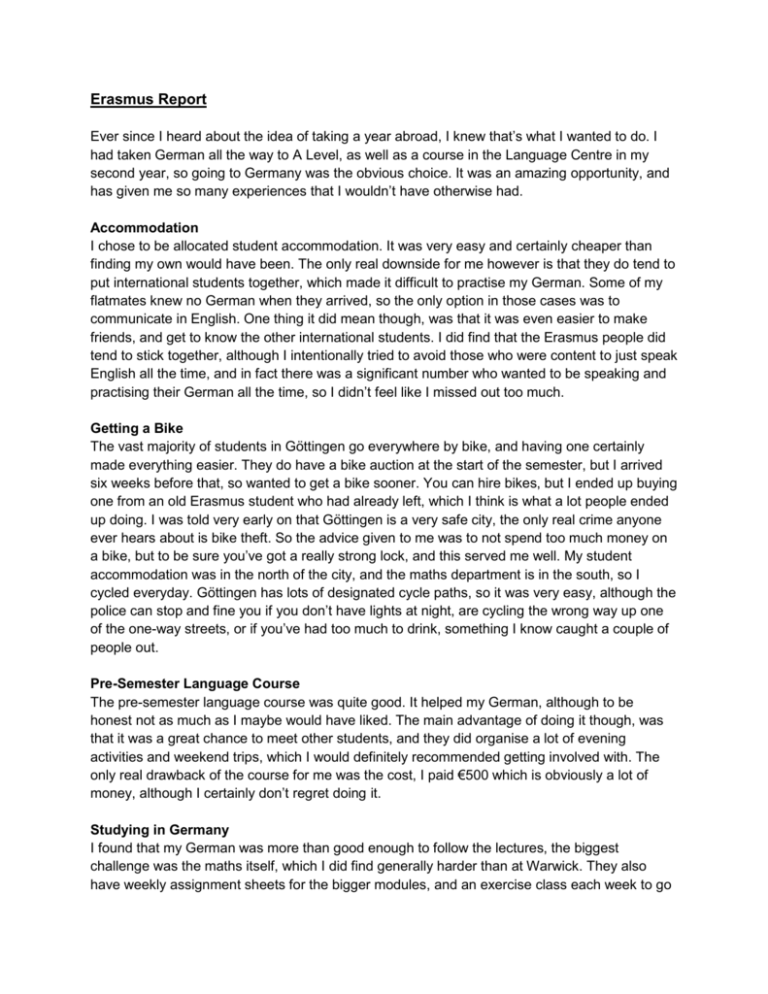
Erasmus Report Ever since I heard about the idea of taking a year abroad, I knew that’s what I wanted to do. I had taken German all the way to A Level, as well as a course in the Language Centre in my second year, so going to Germany was the obvious choice. It was an amazing opportunity, and has given me so many experiences that I wouldn’t have otherwise had. Accommodation I chose to be allocated student accommodation. It was very easy and certainly cheaper than finding my own would have been. The only real downside for me however is that they do tend to put international students together, which made it difficult to practise my German. Some of my flatmates knew no German when they arrived, so the only option in those cases was to communicate in English. One thing it did mean though, was that it was even easier to make friends, and get to know the other international students. I did find that the Erasmus people did tend to stick together, although I intentionally tried to avoid those who were content to just speak English all the time, and in fact there was a significant number who wanted to be speaking and practising their German all the time, so I didn’t feel like I missed out too much. Getting a Bike The vast majority of students in Göttingen go everywhere by bike, and having one certainly made everything easier. They do have a bike auction at the start of the semester, but I arrived six weeks before that, so wanted to get a bike sooner. You can hire bikes, but I ended up buying one from an old Erasmus student who had already left, which I think is what a lot people ended up doing. I was told very early on that Göttingen is a very safe city, the only real crime anyone ever hears about is bike theft. So the advice given to me was to not spend too much money on a bike, but to be sure you’ve got a really strong lock, and this served me well. My student accommodation was in the north of the city, and the maths department is in the south, so I cycled everyday. Göttingen has lots of designated cycle paths, so it was very easy, although the police can stop and fine you if you don’t have lights at night, are cycling the wrong way up one of the one-way streets, or if you’ve had too much to drink, something I know caught a couple of people out. Pre-Semester Language Course The pre-semester language course was quite good. It helped my German, although to be honest not as much as I maybe would have liked. The main advantage of doing it though, was that it was a great chance to meet other students, and they did organise a lot of evening activities and weekend trips, which I would definitely recommended getting involved with. The only real drawback of the course for me was the cost, I paid €500 which is obviously a lot of money, although I certainly don’t regret doing it. Studying in Germany I found that my German was more than good enough to follow the lectures, the biggest challenge was the maths itself, which I did find generally harder than at Warwick. They also have weekly assignment sheets for the bigger modules, and an exercise class each week to go through the previous week’s questions. In order to be allowed to take the exam at the end of the semester, you had to have averaged at least 50% on the assignment sheets and also presented at least one solution in the exercise class. Something which I found to be quite daunting to begin with, although they were very understanding of my imperfect German. The lectures were of a very similar style to Warwick, although they were 90 minutes long and only twice a week, something which I actually quite liked, as it meant fewer trips across the city to the maths department. Something I liked rather less was the early starts; the first lectures of the day were at 8am, which definitely took some getting used to. Choosing modules wasn’t particularly easy. Everything is online and I found it hard to get an idea of everything that was in each module from the descriptions given, although the Erasmus coordinator in the maths department was very helpful. Many of the more advanced courses, that third or fourth years were taking, are taught in English. I didn’t think I should just take the second/third year modules, as such I began by going to Algorithmic Game Theory, Inverse Problems and Introduction to PDEs, as well as Primzahlen and Differenzial- und Integralrechnungen III in German. I found Algorithmic Game Theory to be a very accessible module, that I enjoyed a lot. I quickly dropped Inverse Problems, as it was too advanced and didn’t interest me very much. The PDEs module began fine, however after the second week or so, it became much more complicated and I found it too difficult. I eventually decided to drop it, and do something else, but I ended up feeling too far behind in any other module, so just decided to go back to it. In hindsight, I think I would have found it easier to catch up in a different, easier module, than to try to struggle through, and ultimately failing. I would recommend going to as many modules as possible in the first week, to get the best idea of what you want to do, and asking the lecturers exactly what will be in the module, as some of them didn’t say in the first lecturer, and Diff III for instance, ended up being more about manifolds than anything else. The second semester went a lot smoother. I knew I wanted to do more German, so I took three language courses in grammar, writing and speaking, I enjoyed them a lot, and probably should have done some in the first semester. They are very popular though, and often oversubscribed within an hour of being available to register. I did find however, as with every other module, people dropped out after the first couple of weeks, so if you were on the waiting list, it was sometimes possible to talk to the teacher and take the class anyway, something that happened to me for the speaking module. In terms of maths, I took Angewandte Statistik, Maß-und Wahrscheinlichkeitstheorie and Zum Mathematik im 19. Jahrhundert. I was forewarned that the measure theory module was one of the toughest, however I think the biggest challenge was how much was in it, and how quickly the lecturer moved through the material. Unfortunately taking maths modules meant the exams were later than everything else. I did originally have an exam scheduled for the middle of August, which I had to rearrange with the lecturer to take as an oral exam before I left. Almost all of the exams gave two possible dates, within a week or two of the end of lectures, or else just before the start of the next semester. Obviously for the summer semester, I didn’t really have much choice, although I would normally recommend taking the earlier option anyway because, although you have very little revision time, the lecturer knows this, and everyone told me the early exam is always noticeably easier. Outside of studying There are plenty of things to do when you’re not studying. Göttingen doesn’t have all the societies that Warwick has, however it does have a big sports centre. It doesn’t cost much to join and they’ve got a lot of facilities as well as exercises classes and sports teams to get involved with. I would also recommend going out in the local area; after visiting a local village, Ebergötzen, a small group of us ended up being invited back to their Kirmes festival where we spent the whole day talking to the locals, being shown round the local villages and being given lots of beer and currywurst. It was a really lovely day, which ended up being one of the highlights of the whole year. The International Office is very good as well, they organizes trips and activities, often for free, so for example, I visited a local brewery and went ice skating. They do offer weekend excursions as well and longer trips to cities in Germany. The semester card is also really good for travelling around Germany as it is basically a railcard for the whole of Niedersachsen, making trips to Hamburg, Bremen and Hannover very easy and very cheap to get to. Doing the Erasmus year gave me experiences I'd never otherwise have had, for example it happened to be the 300th anniversary of the union between Hannover and the UK, (when George I became King), so to mark the occasion, Prince Andrew visited the city, and I was one of the students given the chance to meet him. I even ended up on the local news that was covering the event. Summary Looking back I definitely had an amazing year. Although I did learn some maths, meeting so many interesting people, visiting interesting places and improving my German skills are what I’m really takíng away from the year. I’ve made some really good friends, and have already been back visiting them. I would recommend taking an Erasmus year to anyone. It wasn’t always easy, but it was most definitely worthwhile.
